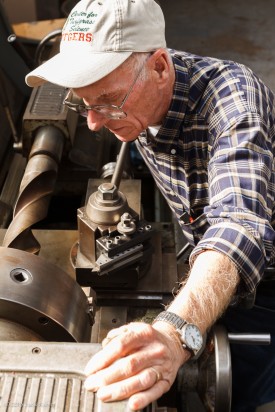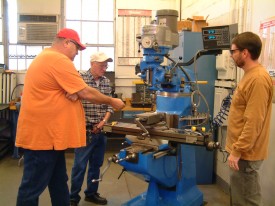Tucked away in a secluded spot off College Farm Road on the George H. Cook Campus, the Rutgers Machine Shop, which is administered by the New Jersey Agricultural Experiment Station, has been a fixture on campus for over 60 years. After a hiatus of about a year, the shop is again up and running, serving Rutgers faculty, staff and graduate students’ needs by fabricating, modifying and repairing research equipment.
Director of Greenhouse Operations Joseph Florentine, who manages the shop, is proud of the shop’s attention to detail and the needs of the client. “We work with the customer to develop and refine the project to meet their needs. Other machine shops will not do this and will only work from blueprints. Their costs are also much higher.”
Support staff for the Machine Shop includes machinist Mike Applegate and greenhouse staff David Lear and Jeff Akers. The shop’s clientele runs the gamut of research departments on all the New Brunswick campuses, from engineering, biomedical to ag engineering. “I am a customer of the machine shop, too. I maintain six research greenhouse facilities and having the machine shop fabricate repair parts has saved my operations time and thousands of dollars,” says Florentine.
An example of a Cook campus research project was a light chamber modification for A.J. Both, associate extension specialist in controlled-environment engineering. Both described what was needed for his study. “I wanted to use LED lamps to grow plants in small growth chambers under these relatively new light sources. LED lamps supposedly consume less electricity and generate less heat while providing interesting options to adjust the light spectrum. Joe Florentine agreed I could use one of the small growth chambers located in the NJAES Research Greenhouse Facility and I received help from the greenhouse and machine shop staff installing an array of mogul-base LED lamps that were arranged in such a way as to allow different light distribution patterns according to the number and position of the lamps turned on. Because the growth chamber was outfitted with a fluorescent lighting system before, a completely new mounting system had to be developed. In addition, modifications to the electrical wiring and switching controls were needed.”
Both could not be happier with the quality of the work at the shop. “I received excellent help at a minimal cost and was very satisfied with the final installation. We conducted several experiments in the chamber using different lighting treatments for tomato production.”
Recent work from the Machine Shop
Mike Applegate making a replacement rotor for a 4-way valve using the milling machine. The valve is used in the NJAES computer-controlled greenhouse for supplying heat, and allows precise temperature control in the greenhouse rooms. The original valve rotor, made of tin-plated iron, was pitted and corroded, causing leakage. The valves are from Holland and difficult to acquire, plus they are now being redesigned and will not fit the piping in the greenhouse. The new part is being made from stainless steel and will not corrode. Applegate started with a solid rod of stainless steel and reproduced the cutouts in the original rotor. Photo by Jack Rabin
While the shop has been in operation since the 1940s, it closed down for a year in 2012 due to lack of funding. In 2008, the shop was turned over to Rutgers Facilities and run by its personnel for four years. As of September, 2013 the Machine Shop was officially re-opened and is again managed by the experiment station.
Unlike other facilities around campus which must replace office, classroom or lab equipment with state of the art models, the shop maintains its original equipment, which performs as effectively as any modern day counterpart, boasts Florentine. “If a piece is needed that requires tolerances to ten thousandths of an inch and an old lathe can do this, there is no need to replace it.”
The equipment in the machine shop is a testament to the saying, “They don’t make them like they used to,” especially considering their original purpose. “A lot of the machinery in the building is surplus U.S. Army equipment from World War II, with some off of battleships that were decommissioned,” explains Florentine. How did they determine the origins of the equipment in the shop? “The army drab color gives it away,” laughs Florentine. He and the staff suspect they’re right about machinery’s battleship origins since many of the pieces in the shop were models that were used on boats at that time.
To arrange for work to be done by the NJAES Machine Shop, call 848-932-3977 or 848-932-9034 or visit the shop’s website.




